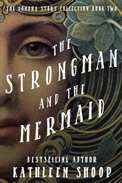
 |
Beginning in present-day Donora, Pennsylvania, the reader is introduced to Patryk Rusek and learns of a dust-ridden, large, coveted book which apparently holds not only a hodgepodge-like history of the town of Donora but also perhaps some of its secrets. Patryk, in bits and starts, shares the story with his grandson, and from there an incredible novel begins. Shoop weaves an extraordinary, expansive narrative, alternating between the small village of Myscowa, Poland, and 1910 Donora, USA. In its stories, the author explores the lives of Lukasz Musial and Mary Lancos, respectively.
Mary (living with sisters and her Matka and Papa) dreams of beginning a family of her own with a caring and supportive man who'll take care of her. Her desire is to one day live in a "lemony house" like the one where she works for Mr. and Mrs. Dunn and where everything is spic-and-span clean. Lukasz, back in Poland, is an incredibly hard worker who dreams of his chance to immigrate to America. He has seen postcards of the "mansion" any ordinary American can own, with a white picket fence in a land ruled not by kings and queens but by the grit and hard determination of rugged individualism. Additionally, Lukasz has visions of a mermaid (which becomes a mythic dream-like vision the author utilizes brilliantly throughout). Finally, the strong Pole wins a "ticket" to the New World.
Through fate and more than 570 pages of amazing writing and storytelling, Mary and Lukasz find each other. Theirs is a true love that is not approved of by Mary's parents, who are traditionally rigid in their ways and do not see what Lukasz has to offer. They have struggled and worked so hard to provide for Mary and her siblings, taking in boarders to help pay the rent—men who work in the dirty and (often literally) backbreaking steel mills. Donora only exists and thrives at this point in 1910 America because of its mills, like much of Pennsylvania.
Shoop is obviously a master storyteller in the popular field of historical fiction. Her prose is poetry, to put it simply and brutally. For readers who may not self-identify as fans of historical fiction, this book is also recommended. The way in which the author has fashioned an epic, enterprising, and deep dive into more than one time and place in human history is simply spellbinding. The novel brings to life on the pages a tale of hardship, of inner drive, and of what it means to be an American, both in the early 1900s as well as having implications for that notion today. If any title were to do the trick insofar as earning readership from a new base of readers and welcoming one into the world of this particular genre, Shoop seems uniquely qualified to serve as that catalyst. The proof lies in the storytelling itself. Further, it becomes obvious that the author has done her homework, becoming fluent in the eccentricities, qualities, customs, and quirks—down to the colloquial language and dialects used—of both worlds: Poland, at the time it was controlled by Russia and Prussia, and America in the 1910s, when Irish immigrants and Scots, Italians, Poles, Czechs, and Hungarians were all risking life and limb to find their way to the States to build a better future through the American Dream.
Complete realism is created in the different geographical locales and their inhabitants, from dialogue to setting to the structure of the plot. This perhaps is the greatest singular strength of the novel. One can almost hear the giant machinery of the steel refineries, smell their thick plumes of smoke, and feel the sharp sting of loose nails and the grind of daily labor on one's fingers and grease-covered hands.
RECOMMENDED by the US Review